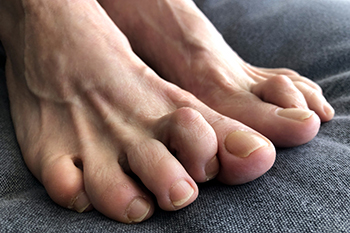
Hammertoe is a deformity where the middle joint of a toe bends downward, resembling a hammer. It often develops due to wearing tight or narrow shoes that force the toes into a bent position. Other causes include muscle imbalances, trauma, arthritis, or genetic predisposition. Conditions like diabetes may also contribute by affecting nerve and muscle function. Symptoms of hammertoe include pain, stiffness, swelling in the affected toe, difficulty straightening it, and the development of corns or calluses from friction against footwear. Over time, the toe may become rigid, limiting movement and causing discomfort during walking or standing. Diagnosis involves a podiatrist examining the toe’s flexibility and alignment. X-rays may be used to assess bone and joint changes. If you think you have a hammertoe, it is suggested that you consult a podiatrist to ensure an accurate diagnosis and a tailored treatment to relieve pain, restore function, and prevent complications.
Hammertoes can be a painful condition to live with. For more information, contact one of our doctors of Advanced Podiatry. Our doctors will answer any of your foot- and ankle-related questions.
Hammertoe
Hammertoe is a foot deformity that occurs due to an imbalance in the muscles, tendons, or ligaments that normally hold the toe straight. It can be caused by the type of shoes you wear, your foot structure, trauma, and certain disease processes.
Symptoms
- Painful and/or difficult toe movement
- Swelling
- Joint stiffness
- Calluses/Corns
- Physical deformity
Risk Factors
- Age – The risk of hammertoe increases with age
- Sex – Women are more likely to have hammertoe compared to men
- Toe Length – You are more likely to develop hammertoe if your second toe is longer than your big toe
- Certain Diseases – Arthritis and diabetes may make you more likely to develop hammertoe
Treatment
If you have hammertoe, you should change into a more comfortable shoe that provides enough room for your toes. Exercises such as picking up marbles may strengthen and stretch your toe muscles. Nevertheless, it is important to seek assistance from a podiatrist in order to determine the severity of your hammertoe and see which treatment option will work best for you.
If you have any questions, please feel free to contact our offices located in Needham, Norwood, and Hanover, MA . We offer the newest diagnostic and treatment technologies for all your foot care needs.
